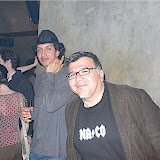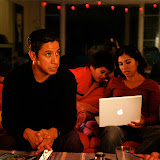
Back in the mid-90's, the Tijuanense writer Luis Humberto Crosthwaite started a small, independent publishing house, Yoremito. It was dedicated to publishing books by authors from northern Mexico, and was positioned as an avenue towards further strengthening a growing readership in northern Mexican literature. Unfortunately the press folded after publishing about 11 books. While a project that gained a lot of interest, it couldn't survive without financial support.
However, those few books that were released are out there still. A testament to the power of independent publishing, I still hope that Yoremito can be somehow resuscitated.
One of the final books that was published was dedicated to rock albums. Written by one of the great music aficionados in Tijuana, the poet Roberto Castillo, the book --Banquete de pordioseros-- was a listing of 50 great rock albums. But the book was not an encyclopedia in the style of the Trouser Press. Rather, it was a memoir: Castillo's life as framed through music. A type of literary mix-tape of the author's top albums. For example, in his listing on Manu Chao's Clandestino, he writes about a weekend in Tijuana, drinking beer, being at a carne asada, talking about music and making random lists while Chao's album plays throughout. Almost a decade later, Nick Hornby --another great music fan-- published a similar book, Songbook (later published as 31 Songs) on another independent publishing house, McSweeney's.
Banquete de pordioseros included not only the essays by Castillo, but also an essay by David Ojeda and top ten lists by musicians, writers, and artists. There was also a top ten list by me. Making it was one of the most nerve wracking experiences of my life. It took me days to create. At one point, Crosthwaite sent me the essay by David Ojeda, to share how cool it was. It didn't help, as I noticed that Ojeda also faced the same issues on how to put together a top ten. HIs solution was to look at the records that were always stacked by the stereo. I began to write a response that I never submitted to Crosthwaite, though I sent in my top ten. Going through the archives this evening, I found it.
Here it is. A piece I called "The Phases of the Moon," and that I dedicated to David Ojeda:
I remember them all, the Psychedelic Furs, R.E.M, the Talking Heads. Bands that affected my life. And what about Wire Train? How to forget Wire Train? These were the bands, growing up in northern California, listening over static filled airwaves to a small radio station in Nevada City. A station which had a program on late night Friday nights dedicated to the newest sounds, punk, new wave, alternative sounds. By day it was high school, surrounded by a student population that listened to Phil Collins, Air Supply, REO Speedwagon. Occasionally there would be someone who believed himself a New Waver and would go off doing New Wave things: multicolored hair, dog collars, sing the lyrics to “Teenage Enemas Nurses in Bondage.” On Friday nights I’d be upstairs in my room, listening intently to a radio station from high in the mountains, trying to decipher the sounds that came through the speakers, the Gang of Four “Damaged Goods,” the Cure “A Forest,” the Stranglers, “All Roads Lead to Rome.” Occasionally the local rock station, would venture from its staple of the Moody Blues, the Rolling Stones, and Led Zeppelin, to play new music: the Plimsouls, “A Million Miles Away,” R.E.M. “Radio Free Europe,” Wall of Voodoo, “Mexican Radio,” Translator, “Everywhere That I’m Not.” I remember them all, coming in over the speakers and sometimes through the television via the new medium of music videos: Killing Joke “Eighties,” Ultravox, “The Voice.” And what about Wire Train? How to forget “Chamber of Hellos,” or “I’ll Do You?” How to forget “Love Against Me?”
At the age of 18 I was uncertain of many things: uncomfortable within my own skin, unsure of dialogue and face-to-face relations. At the university I attended I headed straight for the one logical area for me; the campus radio station, KCSC. As a disc jockey on the Saturday night shift I had no problem with communication. I spoke into the microphone to an imagined listener and expanded my musical knowledge outward by reading the music journals and encyclopedia’s that were left lying around: CMJ, Trouser Press, and The History of Rock and Roll. I discovered Guadalcanal Diary, I discovered Big Black, I discovered X-Mal Deutschland.
I entered the radio in 1984 in the waning days of Post punk and left it in 1990 as Grunge was rearing its ugly head through the College music underground. In between were six years, from Public Image Limited to Sound Garden. I remember them all: the local bands, the radio station parties, concerts by Los Lobos, the Replacements, the Del Fuegos, the Cure, Fugazi, X-Mal Deutschland, Wire Train. It was about music, the soundtrack to the crazy musical that makes up our lives.
Yes David, it is true, music affects all of us.
Music too for me is one of those unlisted essentials that governs my life along with those other essentials as breathing, air, and food: coffee in the morning, a shot of tequila in the evening, waking up next to my wife, watching movies —mindless action films in the summer, “art” films in the winter—, discussions with friends, lounging on the carpet. Music is the thread that runs through all.
Music has defined my life for many years, the earliest song that I remember is Terry Jacks “Seasons in the Sun,” a terrible confession to make from one who later listened to punk rock. Maybe that’s the explanation for my later musical tastes. From those questionable beginnings it was the music that filtered through my house, the pop that my parents listened to —the overrated Beatles, the music of the American Top 40— the Chicano Afro-Latin stylings that my tíos listened to— Santana, the Tower of Power— and the Mexican boleros that filtered throughout my grandmothers house in Mexicali.
Music grabs us, takes us into its grip. With particular songs we are transported to other times, moments, memories. Yes, it is true. You know it and I know it. Coming home from a day at the office I will first turn on the stereo to whatever I had playing before I left for the day. Before leaving on a trip I will flip through my cassettes, choosing the tapes that will form the soundtrack to my drive. My wife in particular hates this last one as she prefers to listen to the radio when we take a long drive.
But you understand, don’t you? You too have felt the grip of a particular song that has winded its way through your insides.
So our friend Luis Humberto Crosthwaite called to talk about this book on rock music by Roberto Castillo that his press was publishing. Luis was hoping to including top ten lists from members of rock bands, writers —among them José Agustín and you—, and why not? A list from a former college radio disc jockey. A cool idea, no? And I thought, yes, of course, an excellent idea. But then the terror set into me too.
My ten favorite albums?
Where to begin?
As I wandered about town, I considered the problem I had placed myself in. Do I take the academic and pedantic route, list the albums that I believe every rock listener should have? Or do I take the more personal route, simply make a list of those albums which have defined my life (and if Billy Joel is on that list, then so be it)? Driving home from the office I thought of the different paths that my musical memory was taking. Santana to Tower of Power to the Velvet Underground to The Stooges to Robert Palmer to Café Tacuba to Pere Ubu to War to Caifanes to Nina Hagen to Mecano to the Talking Heads to Tom Waits to the Cocteau Twins. And what about the Lounge Lizards? Could they be considered? And if so, what about the Balanescu Quartet?
And yet, David I cannot agree with you. The choosing of the ten favorite albums is not easy to do. It is not a question of pulling out those albums that we always have near the stereo. What about those of us who constantly change those albums? What then? Does this make me less a lover of music? Less a man because I cannot pull 10 albums out of the air? My musical tastes change, my ever-changing moods; perhaps governed by the phases of the moon:
New Moon: This moon presents new or distinct waves, populated by such bands as Kraftwerk, The Psychedelic Furs, OMD, Plastilina Mosh, Magazine, and Devo.
Red Moon: a moon of muffled sounds mixed, transformed, and filtered through sonic blasts held together by odd beats. Bands like: Pere Ubu, Wire, Sonic Youth, Meat Beat Manifesto, the Propellerheads.
Quarter Moon/Sickle Moon: sounds that weave brief flashes of light through darkness. Bands like X-Mal Deutschland, the Cure, King Crimson, Caifanes, the Stranglers.
Harvest Moon: The Pixies, Midnight Oil, R.E.M, the Police, Soda Stereo, the Smashing Pumpkins, the Jam, Manu Chao, Wire Train.
Half Moon: The Style Council, Mano Negra, Café Tacuba, Paralamas, the English Beat, the Fabulosos Cadillacs, Poncho Kingz, the Beastie Boys.
Blue Moon: The blue moon is a rare moon. These bands are more ethereal in sound, bands like Dead Can Dance, Cocteau Twins, Xymox, This Mortal Coil, Japan, Breathless, Air, and Madredeus.
Full Moon: The night of the full moon is a classic moon. The bands; Creedence Clearwater Revival, Santana, War, ELO, Steely Dan, the Replacements.
Black Moon: Big Black, Mission of Burma, Gang of Four, Víctimas del Dr. Cerebro, the Cramps.
My musical history is wrapped around my life. While living in Mexico City, friends would send me mix tapes to keep me up to date on the scene. One friend from the radio station sent me a few tapes with the new stuff that was coming into the station station. One tape I remember contained the latest single from Xymox, a band whose album, Medusa, I had been listening to constantly the year before. There was also “I’ve been Tired,” from a band I’d never heard, the Pixies. I remember it changed the Mexico City air as I traveled on the metro, listening to the song on my Walkman. It reminded me of the first time I heard Big Black. “Kerosene” was requested one night during my show. The crazy metal sounds that Steve Albini drew out of his guitar hooked me immediately. The Pixies took me back to Big Black who took me back to Wire who took me forward, years later, to Nirvana and Rage Agains the Machine.
I remember them all, those songs that sank below my skin, those albums that played constantly on my stereo. In the end, the exercise that brought me to formulate a list of my favorite rock albums became a trip across the musical geography of my life. It’s all about music isn’t it? The soundtrack of our lives.



No comments:
Post a Comment